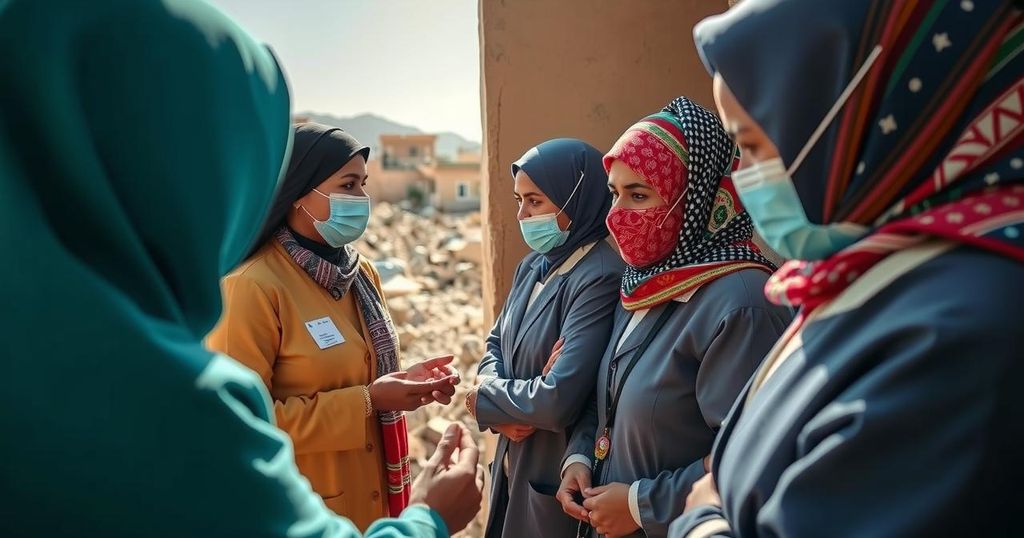Midwives Providing Critical Support to Earthquake-Affected Communities in Morocco

The article details the response of midwives from the Association Marocaine des Sages-Femmes (AMSF) in the wake of a devastating earthquake in Morocco in September 2023. These midwives, supported by the International Confederation of Midwives (ICM) and funded by Direct Relief, established medical caravans to deliver critical healthcare services, including prenatal care and psychological support, to affected populations. As part of future preparedness, training programs have been developed to enhance midwives’ abilities to respond to emergencies effectively.
In September 2023, Morocco experienced a catastrophic earthquake, registering a magnitude of 6.8. This natural disaster caused extensive devastation, particularly in the rural regions of the Atlas Mountains, leading to the tragic loss of over 2,900 lives and injuring more than 5,500 individuals. The consequences were particularly severe for pregnant women, who faced increased health risks amidst the turmoil following the quake. In this moment of crisis, midwives from the Association Marocaine des Sages-Femmes (AMSF), with support from the International Confederation of Midwives (ICM), rose to the occasion to deliver essential care and assistance. They mobilized to serve affected communities through the establishment of five medical caravans, with funding from Direct Relief, which traversed the hardest-hit areas such as Saidate, Tighdouine, Zerkten, Onein, and Timzdagiouine. A sixth caravan, initiated in collaboration with ICM, was dispatched to Ouirgane in Al Haouz Province, a region in dire need of healthcare services. On January 13, 2024, AMSF midwives operated a mobile clinic in Ouirgane. Within the span of a single day, they provided healthcare services to 169 individuals, which included prenatal care, general medical consultations, and screenings for various health conditions, including HIV, diabetes, and hypertension. Additionally, they conducted ultrasounds to monitor fetal health and provided educational initiatives regarding family planning, nutrition, and breastfeeding. Moreover, the midwives distributed 140 dignity kits, 10 newborn kits, and winter clothing to families who found themselves vulnerable as a result of the disaster. For patients requiring advanced medical intervention, referrals were made to higher-level health facilities, such as Marrakech University Hospital, thereby ensuring continuity of care for individuals in need. In addition to physical health services, the midwives offered psychological support through individual and group counseling sessions aimed at assisting women grappling with trauma and loss. Special attention was given to women who had experienced gender-based violence, demonstrating the extensive and compassionate role midwives serve within their communities. One of the primary obstacles faced by these midwives was the challenge of accessing remote locations where health facilities had either been severely damaged or were otherwise inaccessible due to the earthquake. Nonetheless, via their established connections with local networks and communities, the AMSF midwives persevered, guaranteeing that essential care reached those who required it the most. Looking to the future, AMSF and ICM are preparing to enhance the capabilities of midwives in responding to similar crises. AMSF has advocated for additional training for its members, prompting ICM to develop the “Ready to Respond: A Midwife’s Guide to Humanitarian Action” program. This comprehensive training initiative is designed to equip midwives with the knowledge and skills needed to respond effectively to emergencies, covering critical areas such as disaster management and respectful maternity care in crisis situations. In May 2024, ICM conducted a three-day Train the Trainer (ToT) program in Rabat, where AMSF midwives received training on needs assessment during crises, newborn care management in emergencies, and advocacy for the inclusion of midwives in national emergency response plans. With this advanced training, midwives will be better positioned to safeguard the health of their communities and promote more robust and inclusive health systems in future disaster scenarios. The collaboration between Direct Relief, ICM, and AMSF exemplifies the vital leadership midwives can provide in times of urgent need. As the affected communities of Morocco embark on the slow journey of recovery, the unwavering dedication of these midwives remains evident, offering not only midwifery care but also hope and stability to those who have suffered tremendously. A video documenting the caravan’s efforts in Ouirgane captures the resilience and courage of these midwives as they contribute to Morocco’s recovery endeavors.
The article discusses the response efforts of midwives to the earthquake that struck Morocco in September 2023, which resulted in significant casualties and injuries, particularly affecting vulnerable populations such as pregnant women. It highlights the role of midwives from AMSF, who, with the assistance of ICM and funding from Direct Relief, mobilized medical caravans to provide critical healthcare services and support to those in need. The article emphasizes the challenges faced during the response and the initiatives being implemented to prepare for future emergencies.
In summary, the response of midwives during the earthquake in Morocco highlights their essential role in providing care and support to affected communities. Through their determination and compassion, these midwives have not only addressed immediate health needs but also contributed to the emotional recovery of individuals grappling with trauma. Their ongoing training and preparedness efforts signify a commitment to enhancing healthcare responses in future crises, ensuring that communities are better equipped to handle challenges ahead.
Original Source: internationalmidwives.org






